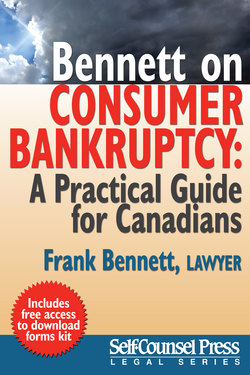Читать книгу Bennett on Consumer Bankruptcy - Frank Bennett - Страница 11
На сайте Литреса книга снята с продажи.
5. Protection Against Lawsuits
ОглавлениеOnce the consumer debtor is in bankruptcy, a creditor who has a claim provable in the bankruptcy is stopped or prevented from starting any lawsuit or continuing any lawsuit against the bankrupt or the bankrupt’s property. The bankruptcy operates as a stay of legal proceedings by most creditors. These creditors have a right to look to what property the bankrupt had at the time of bankruptcy for payment. They are not entitled to take any legal proceedings against the bankrupt except with the permission of the court. This permission is rarely given except in the cases of fraud, misrepresentation, or with respect to the enforcement of a support order or in the case of a motor vehicle claim where there is insurance coverage. Bankruptcy does not stop or stay criminal investigations or contempt proceedings.
Secured creditors can enforce their security against the bankrupt. They do not need the court’s permission to repossess the person’s property after bankruptcy. For example, a secured creditor could seize the bankrupt’s vehicle if payments are in arrears or a secured creditor could foreclose on the bankrupt’s home for arrears of mortgage payments or taxes.
Therefore, the bankrupt can be assured that the sheriff or bailiff will not seize his or her assets or take garnishment proceedings without a special court order being made.
